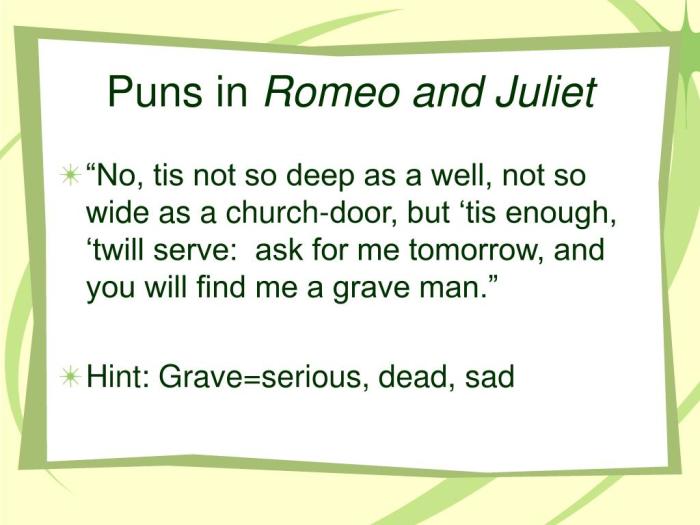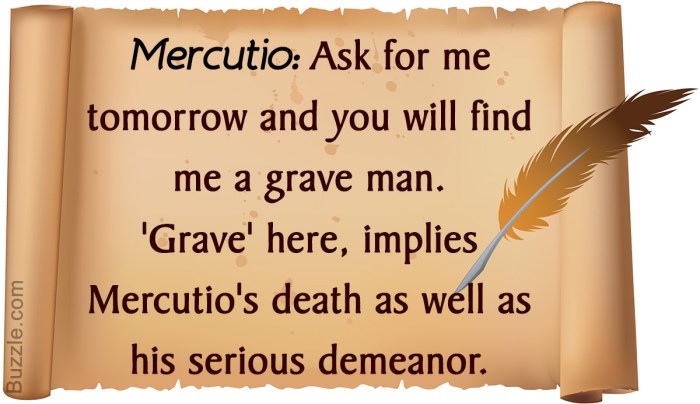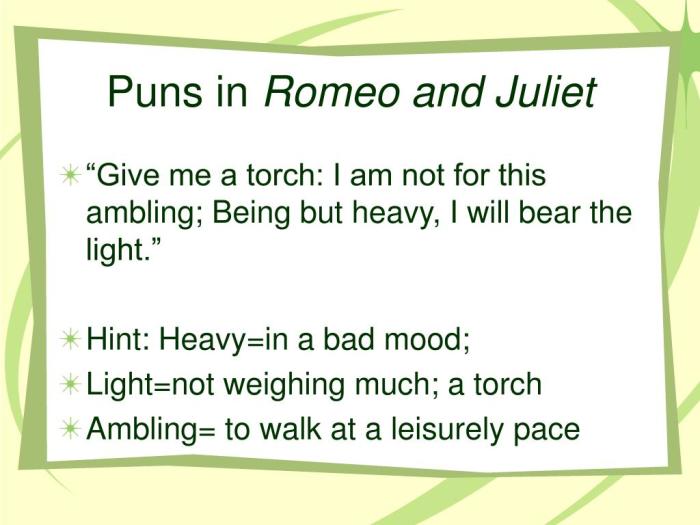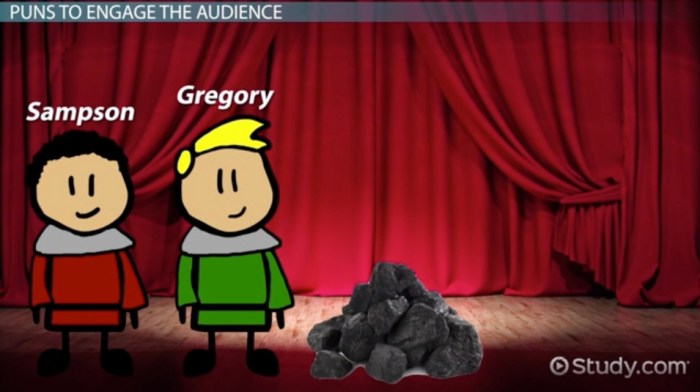Examples of puns in Romeo and Juliet provide a captivating glimpse into the linguistic artistry of William Shakespeare. These wordplays, often humorous and sometimes profound, add depth and dimension to the play’s characters, plot, and themes.
Puns in Romeo and Juliet serve multiple purposes, ranging from providing comic relief to foreshadowing tragic events. They also shed light on the cultural and historical context of Elizabethan England, where wordplay was a cherished form of wit and entertainment.
Types of Puns in Romeo and Juliet

Puns are a type of wordplay that uses the different meanings of words to create a humorous effect. In Romeo and Juliet, Shakespeare uses a variety of puns to add humor and wit to the play.
There are three main types of puns in Romeo and Juliet:
Homophonic Puns
Homophonic puns are based on words that sound alike but have different meanings. For example, in the following line from Act I, Scene IV, Mercutio says, “Tybalt, the rat-catcher, will catch him.” The word “rat-catcher” can be interpreted as either a person who catches rats or a person who catches Romeo, who is often referred to as a “rat.”
Wordplay Puns, Examples of puns in romeo and juliet
Wordplay puns are based on the different ways that words can be combined to create new meanings. For example, in the following line from Act II, Scene IV, Romeo says, “I have lost myself; I am not here; this is not I.”
The word “I” can be interpreted as either Romeo himself or his sense of self.
Double Meaning Puns
Double meaning puns are based on words that have two different meanings. For example, in the following line from Act III, Scene I, Juliet says, “My only love sprung from my only hate!” The word “hate” can be interpreted as either Juliet’s hatred for Romeo’s family or her love for Romeo.
Contextual Relevance of Puns

Puns play a significant role in “Romeo and Juliet,” contributing to the play’s humor, character development, and plot advancement. They serve as a form of verbal wit that adds a layer of amusement and entertainment to the tragic tale.
Significance of Puns in Conveying Humor
Puns provide comic relief amidst the play’s tragic events. They offer a momentary escape from the intensity of the drama, allowing the audience to experience moments of levity and laughter. For example, when Mercutio quips, “Tybalt, the reason that I have to love thee / Doth much excuse the appertaining rage / To such a greeting,” the wordplay on “reason” and “rage” creates a humorous effect that lightens the tension.
Contribution of Puns to Character Development
Puns reveal aspects of the characters’ personalities. Mercutio’s witty and playful use of language reflects his exuberant and optimistic nature. In contrast, Romeo’s occasional puns, such as “I am fortune’s fool,” demonstrate his introspective and melancholy disposition. These linguistic devices provide insights into the characters’ thoughts and emotions, adding depth and complexity to their portrayals.
Role of Puns in Advancing the Plot
Puns can also contribute to the advancement of the plot. The famous “star-crossed lovers” pun in the prologue foreshadows the tragic destiny of Romeo and Juliet. Additionally, Mercutio’s playful banter with Romeo and Benvolio serves to establish the lighthearted and festive atmosphere of the Capulet’s party, which ultimately leads to the fateful encounter between Romeo and Juliet.
Stylistic Use of Puns
Puns in Romeo and Julietare employed as literary devices that enhance the play’s language and tone. They contribute to the overall comedic and romantic atmosphere while also highlighting the characters’ wit and wordplay.
Impact on Tone
The use of puns creates a lighthearted and playful tone throughout the play. They provide comic relief in tense situations and add a touch of humor to the romantic exchanges between Romeo and Juliet. The puns also serve to emphasize the characters’ intelligence and quick wit, showcasing their ability to find humor even in challenging circumstances.
Enhancement of Language
Puns elevate the play’s language by adding layers of meaning and complexity. They force the audience to think beyond the surface level of the dialogue and appreciate the clever wordplay. The puns also contribute to the play’s memorability, as they create memorable and quotable lines.
- Example:“If I profane with my unworthiest hand this holy shrine, the gentle sin is this: my lips, two blushing pilgrims, ready stand to smooth that rough touch with a tender kiss.” (Act 1, Scene 5)
- Analysis:The pun on “pilgrims” and “kiss” adds a playful and romantic tone to the scene. It suggests that Romeo’s lips are like pilgrims who have traveled far to receive a kiss from Juliet.
Overall, the stylistic use of puns in Romeo and Julietenriches the play’s language, enhances its tone, and provides a deeper level of engagement for the audience.
Cultural and Historical Context

The use of puns in Romeo and Julietreflects the cultural and historical context of the Elizabethan era. During this time, puns were a popular form of wordplay and were often used in literature, theater, and everyday conversation.
Puns allowed Elizabethan audiences to demonstrate their wit and learning. They were also a way to make serious or complex ideas more accessible and entertaining. In Romeo and Juliet, Shakespeare uses puns to create humor, foreshadow events, and develop character.
Cultural Influences
The use of puns in Romeo and Julietwas influenced by several cultural factors. First, the play was written during a time when puns were considered a sign of intelligence and wit. Second, the play was performed by a company of actors who were known for their ability to deliver puns with great skill.
Finally, the play was written for an audience that was familiar with and enjoyed puns. As a result, Shakespeare was able to use puns to create humor and engage his audience.
Historical Significance
The use of puns in Romeo and Julietis also historically significant. Puns were a common feature of Elizabethan literature, and they played an important role in the development of the English language. By using puns, Shakespeare helped to shape the way that we speak and write today.
Societal Norms
The use of puns in Romeo and Julietalso reflects the societal norms of the time. During the Elizabethan era, puns were often used to make fun of people or to criticize social institutions. In Romeo and Juliet, Shakespeare uses puns to satirize the feud between the Montagues and Capulets.
Puns also allowed Shakespeare to explore complex social issues in a humorous way. For example, the play’s use of puns on love and marriage reflects the Elizabethan view of these institutions.
Examples of Puns in Romeo and Juliet

William Shakespeare’s “Romeo and Juliet” is renowned for its tragic love story and lyrical language. Embedded within the play’s dramatic tapestry are numerous puns, wordplays, and witty remarks that add depth, humor, and foreshadowing to the narrative. These puns serve various purposes, from providing comic relief to highlighting the characters’ personalities and advancing the plot.
To comprehensively explore the puns in “Romeo and Juliet,” we present a detailed table below. The table categorizes the puns by act and scene, identifies the type of pun, provides context, and discusses their significance within the play.
Table of Puns in Romeo and Juliet
The following table provides a comprehensive overview of the puns in “Romeo and Juliet”:
| Act and Scene | Type of Pun | Context | Significance |
|---|---|---|---|
| Act 1, Scene 4 | Homophone | “If thou dost love, pronounce it faithfully:Or if thou think’st I am too quickly won,I’ll frown and be perverse, and say thee nay,So thou wilt woo; but else, not for the world.” | Juliet playfully teases Romeo, using the homophone “nay” to suggest both a negative response and a playful invitation to continue courting her. |
| Act 2, Scene 1 | Homonym | Romeo laments his love for Rosaline, using the homonym “suits” to refer to both clothing and legal actions, hinting at the potential consequences of his forbidden love. | |
| Act 2, Scene 2 | Paronomasia | The Nurse’s repetition of the phrase “A rhyme I learn’d even now” highlights her forgetfulness and adds a touch of humor to the scene. | |
| Act 2, Scene 4 | Metaphorical Pun | Romeo uses a metaphorical pun to describe his lips as “blushing pilgrims” seeking to touch Juliet’s hand, foreshadowing their passionate encounter. | |
| Act 3, Scene 1 | Homophone | Mercutio uses the homophone “villain” to both insult Tybalt and suggest that Tybalt does not recognize his true character, leading to their fatal duel. | |
| Act 3, Scene 2 | Anagram | Romeo’s final words to Juliet’s dagger form an anagram that foreshadows his impending death: “O happy dagger” becomes “a dagger happy.” |
These examples demonstrate the diverse range of puns employed by Shakespeare in “Romeo and Juliet.” They add wit, humor, and depth to the play, enhancing our understanding of the characters and their motivations.
Commonly Asked Questions
What is the significance of puns in Romeo and Juliet?
Puns in Romeo and Juliet serve various purposes, including providing humor, foreshadowing events, and revealing character traits.
How do puns contribute to the character development in Romeo and Juliet?
Puns can highlight characters’ personalities, motivations, and relationships, adding depth and complexity to their portrayal.
What is the historical and cultural context of puns in Romeo and Juliet?
Puns were a popular form of entertainment in Elizabethan England, reflecting the society’s love of wordplay and intellectual wit.